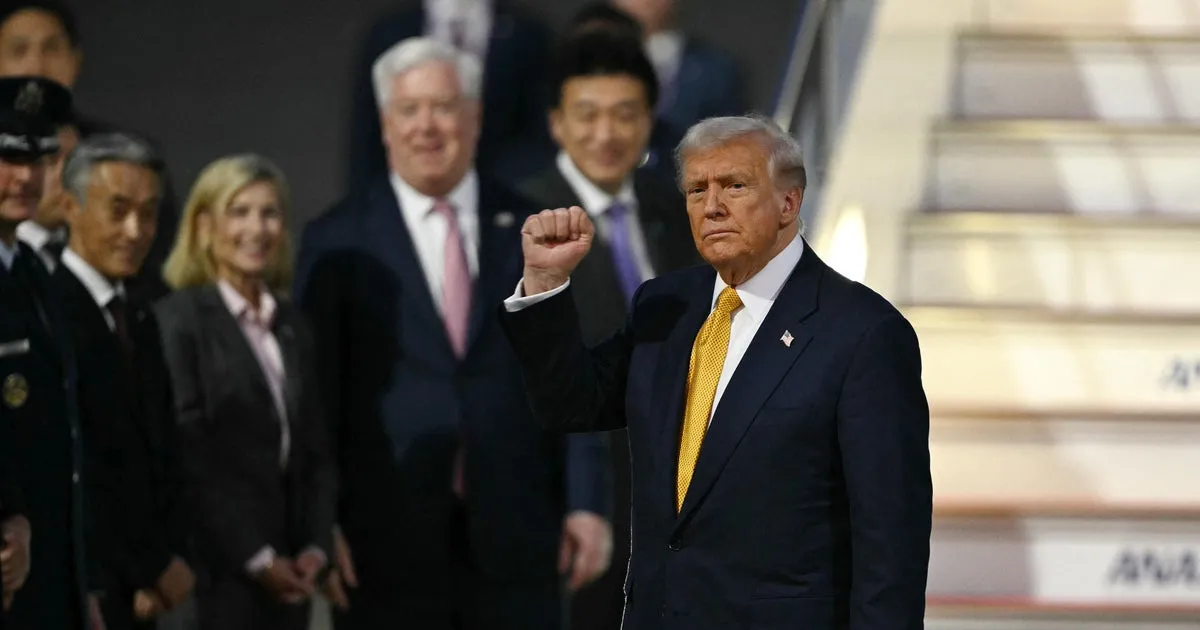
On Monday, President Trump arrived in Japan, where the newly elected Prime Minister Sanae Takaichi is eager to cultivate a personal rapport with the U.S. leader to alleviate existing trade tensions. This visit marks a significant moment in Trump's ongoing Asian tour, which emphasizes enhancing business ties between the United States and its Asian partners.
As Trump touched down in the Japanese capital, he expressed optimism regarding a potential U.S.-China trade agreement, predicting that negotiations would conclude before his return to Washington. However, his meeting with Takaichi represents an early diplomatic challenge for Japan's first female leader, who assumed office just last week and leads a fragile coalition government.
During his flight to Tokyo aboard Air Force One, Trump addressed the press alongside key officials, including Secretary of State Marco Rubio, Treasury Secretary Scott Bessent, and U.S. Trade Representative Jamieson Greer. He highlighted the strong friendship between the U.S. and Japan, praising Takaichi's close ties to former Prime Minister Shinzo Abe, with whom Trump previously established a positive relationship during his first term in office. "It's going to be very good," Trump remarked, emphasizing the benefits this friendship brings to both nations.
Following his arrival, Trump's only scheduled engagement on Monday was a meeting with Emperor Naruhito, Japan's ceremonial head of state, at the Imperial Palace. The emperor greeted Trump with a smile as his limousine arrived. The two leaders exchanged pleasantries and posed for a photograph before entering the palace for a brief, half-hour meeting that the White House characterized as a courtesy call.
On Sunday, the American leader spent time in Malaysia, where he participated in a regional summit with Southeast Asian nations. During this summit, Trump secured preliminary trade agreements with Malaysia, Thailand, Cambodia, and Vietnam. He later informed reporters aboard Air Force One that he anticipated finalizing a trade deal with China within the week, following an initial consensus reached by officials from both economies.
In his comments, Trump expressed respect for Chinese President Xi Jinping and conveyed confidence that a favorable agreement would emerge from their upcoming meeting. Additionally, Bessent announced on CBS’s Face the Nation that a deal regarding the popular app TikTok, initially discussed last month, is set to be finalized during the Trump-Xi meeting later this week.
As Trump continues his Asian tour, he is scheduled to conclude his visit in South Korea, where he plans to meet with Xi again at the Asia-Pacific Economic Cooperation (APEC) summit. Notably, Trump has expressed a willingness to extend his trip if it allows for a conversation with North Korean leader Kim Jong Un. Despite previous attempts at engagement, Trump's overtures to Kim have not been reciprocated.
In a recent interview, Trump dismissed the notion of running for the U.S. vice presidency as a means to return to the presidency, stating, "I think it's too cute." He clarified that while he is technically allowed to do so, he believes it wouldn't resonate well with the public. Trump also acknowledged the potential for other Republican leaders, including Rubio and Vice President JD Vance, to emerge as formidable candidates in future elections.
Amidst his diplomatic efforts, Trump remains focused on pressing security issues in the region, including tensions related to the South China Sea and the status of Taiwan. However, his primary emphasis lies on trade and the reorientation of the global economy in line with his America First vision. This approach often includes the strategic use of tariffs as a tool to bolster domestic manufacturing and negotiate more favorable trade terms, although his unilateral authority to impose such tariffs is currently under judicial review.